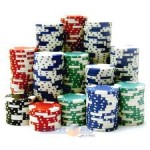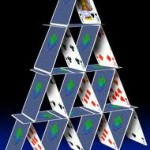I don’t normally work with kids but one day I was called by a colleague whose nephew was struggling with exam anxiety. Having watched my video on youth anxiety, he asked if he could see me. Now anxiety is anxiety, whether in adolescents or adults, but I don’t normally work with clients so young. I tend to use rational arguments to help clients overcome anxiety and I knew my normal language would have been a little too complex for this young man. Instead I used an image to illustrate how our beliefs affect our emotions.

The analogy I used has to do with core beliefs we hold. If I believe I am smart and I belong in my class, then I don’t worry so much if I have all the answers. I remain a smart kid who happens not to know a particular answer. If, on the other hand, I have poor self-confidence, or believe that I am some sort of impostor, a mistake becomes proof of my stupidity. Any mistake becomes a disaster.
My client is a really nice kid who is also very smart. But the reason he gets so stressed out when he has to perform is because so much is at stake. At least in his own mind. I used an analogy of a house of cards versus a pile of loonies (Canadian dollar coins) to help him see that things are not so crucial. A house of cards has to be perfect. Remove one card and it all collapses. This is how he saw himself. On the other hand, if he had a pile of dollar coins and removed a single one, nothing fundamental would change.
 I often use analogies to help clarify core beliefs. When we step back, we can ask ourselves fundamental questions such as, “Do I belong? Am I smart? etc…” If there is nothing wrong with our fundamental reality (the core belief), we will not be so reactive to day-to-day events. It may be a little convoluted but it was my way of saying, “Relax, kid. You’re smart. You have a proven track record. Whether you get a high grade on your next exam or not won’t change anything.”
I often use analogies to help clarify core beliefs. When we step back, we can ask ourselves fundamental questions such as, “Do I belong? Am I smart? etc…” If there is nothing wrong with our fundamental reality (the core belief), we will not be so reactive to day-to-day events. It may be a little convoluted but it was my way of saying, “Relax, kid. You’re smart. You have a proven track record. Whether you get a high grade on your next exam or not won’t change anything.”
For an adult audience, I changed to pile of loonies to a pile of poker chips in today’s column. Here it is:
The house of cards and the stack of chips
(Source: Le château de cartes et la pile de jetons. Journal Métro, July 17, 2012.) Voir plus bas pour la version Française.Is your level of self-confidence like a house of cards or a big stack of poker chips? A house of cards looks impressive but take just one card away and everything falls apart. On the other hand, if you take one chip away from a large stack of poker chips, you still have a big pile of money.
The question of how we deal with setbacks is an important one. They are inevitable. A confident person remains unfazed by setbacks. One who feels like an impostor is destroyed by them.
Building on success
How then does one go about increasing self-confidence? The first factor to consider is that it isn’t an all or none thing. It gets built over time in small steps. This cannot be achieved if we are too easily discouraged by failure or error. No one can be good right from the start. Looking in the mirror and pumping yourself up won’t cut it. You need to practice as well. It hardly matters if you’re a natural; everyone improves with practice. If you are too easily discouraged by early failure, you will tend to give up before you can develop your skills and, consequently, your confidence.Another factor involves your standards. We all have differing levels of abilities, but pure ability is only a small factor in success. Meeting your expectations is far more important. If you expect too much, you will face more failure than another person with similar performance.
Attributing failure
Perhaps the most important factor in self-confidence is how we attribute failure. People who accept failure as a necessary part of the learning process are not discouraged. They make external attributions, which means they see the problem as unrelated to them. The problem lies in the difficulty of the challenge itself, not with them personally.Others make internal attributions. These people think errors reflect some internal inability. As a result, they think they lack skills and give up quickly in order to avoid making fools of themselves.
The manner in which we interpret failure – whether it is a poor grade, an error in a softball game, or a collapsed soufflé – will determine if we build self-confidence or not. People who keep plugging away at their stacks of chips won’t worry about minor setbacks and gain confidence. People who feel like impostors see any minor error as a sign their skills were just an elaborate house of cards with no real substance. They rarely build confidence.
Voici la version Française:
Le château de cartes et la pile de jetons
Votre confiance en vous a-t-elle la solidité d’un château de cartes ou d’une pile de jetons de poker? Le château est impressionnant, mais il suffit d’enlever une carte pour qu’il s’écroule. Par contre, si on retire un jeton d’une pile de jetons de poker, il reste toujours un tas d’argent.
Ce qui compte, c’est notre façon de réagir aux revers de la vie. Même s’ils sont inévitables, lorsqu’on a confiance en soi, ils nous laissent impassibles. Mais celui qui se sent comme un imposteur est anéanti par ceux-ci.
Tirer parti des réussites
Comment, alors, augmenter sa confiance en soi? D’abord, il ne s’agit pas d’une question de tout ou rien. L’assurance se gagne au fil du temps, par étapes. Et on n’y parvient pas si on se laisse trop facilement décourager par l’échec. Personne ne peut exceller dès le départ. Bomber le torse en se regardant dans le miroir n’y changera rien. Il faut s’entraîner. Même si tu as ça dans le sang, la pratique est toujours nécessaire. Si vous vous laissez décourager trop facilement par l’échec, vous aurez tendance à abandonner avant d’avoir pu acquérir des habiletés. Par conséquent, votre confiance ne grandira pas.Vos standards ont aussi leur rôle à jouer. Nous avons tous des niveaux d’aptitudes différents, mais l’habileté pure n’est qu’un petit facteur de la réussite. Satisfaire ses propres attentes est beaucoup plus important. Si vos attentes sont trop élevées, vous subirez plus d’échecs qu’un autre dont la performance est semblable.
L’attribution de l’échec
Mais, le facteur le plus important est peut-être la façon dont nous imputons l’échec. Ceux qui l’acceptent en tant que composante nécessaire de l’apprentissage ne se découragent pas. Ils procèdent à une attribution externe, c’est-à-dire qu’ils voient le problème comme étant extérieur à eux, dans la difficulté du défi à relever, et non en eux.D’autres procèdent à une attribution interne. Ils pensent que les erreurs traduisent une inaptitude interne et ils abandonnent rapidement, afin d’éviter de se couvrir de ridicule.
La façon dont nous interprétons l’échec (piètres résultats scolaires, erreur commise dans un match de baseball, soufflé qui s’affaisse) détermine si nous acquérons ou non de l’assurance. Ceux qui continuent à édifier leur pile de jetons ne s’en font pas avec les petits revers et gagnent de l’aplomb. Ceux qui se sentent comme des imposteurs voient toute erreur mineure comme un signe que leurs aptitudes n’étaient qu’un château de cartes fondé sur du vide. Ils acquièrent rarement de la confiance en eux.
Tagged as impostor syndrome, Self-confidence, test anxiety.
Posted in Anxiety, Human nature, Stress.
Posted on 17 Jul 2012
